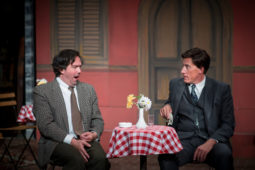 UNDER THE DEFT DIRECTION of Guillermo Cienfuegos, Pacific Resident Theatre is staging a truly stunning hit production of a play that’s six decades old. And on a second PRT stage, Minghella’s two radio plays directed by Michael Peretzian are utterly compelling.
UNDER THE DEFT DIRECTION of Guillermo Cienfuegos, Pacific Resident Theatre is staging a truly stunning hit production of a play that’s six decades old. And on a second PRT stage, Minghella’s two radio plays directed by Michael Peretzian are utterly compelling.
When Eugene Ionesco wrote “Rhinoceros,” it was about the totalitarian takeover of his native Romania and the dangers of ideological group think, both right and left. On its surface, this play is an absurd romp, but its themes ultimately resonate all too ominously with our own times.
It’s a sunny Sunday in a small provincial town in France and the locals are going through their usual rituals: the café tables and chairs are being set up, the grocer is arranging his produce and the (live) accordionist in mime makeup is playing a stereo-typically Parisian-sounding ditty.
Scruffy and hung over, every man Berenger (Keith Stevenson) shows up, and seconds later so does his immaculately dressed (and coiffed — important later) friend Jean (Alex Fernandez) who scolds him for being late — even though they both are.
Jean believes he holds the intellectual and moral high ground and lectures the drink-dissipated Berenger about how to improve his life, dress better, think better thoughts, behave more success- fully toward the object of his desire, Daisy (Carole Weyers), in short, to be more like him.
The use of clichés permeates the play. Simple statements, like “exercise your mind!” and “well, of all things!” and later, when explanations for what’s happening are merely parroted by the characters, repetition and reinforcement of simple slogans replace meaningful conversation and critical thinking.
Logic and how it can be twisted to serve any purpose is a major theme. There is a logician (Sarah Brooke) who explains the use of syllogisms, but they’re ridiculous. For example the Old Gentleman character (Peter Elbling) concludes that if a cat has four paws, and his dog has four paws, therefore his dog must be a cat; he declares the use of logic “a beautiful thing.” The logician agrees, except to say, “As long as it is not absurd.”
At that very moment, the sound of thundering hooves rumbling and pounding in the distance grows closer and louder and a rhinoceros roars through their tiny square. It happens again, only this time a cat is trampled and the entire town at first is baffled, then outraged.
Their bafflement leads them to argue about whether the same rhinoceros has been seen twice or whether it’s two different animals. Whether it’s an Asiatic or African rhinoceros, whether it has one horn or two, whether one is superior to the other—a stand-in for Nazi propaganda supporting Anti-Semitism and racism.
As the characters grow angrier, a “mass movement” of outrage begins: this should not be allowed! A cat has been trampled! Let us demand that something be done!
And that is the beginning of the unraveling of normalcy, the appearance of more and more rhinoceroses in their midst, and the metamorphosing of the characters. Yes, the people give in to “rhinoceritis,”and eventually all but Berenger, who refuses to capitulate, become the big, ugly, unthinking animals themselves.
Watching Jean transform himself onstage before our eyes is a real feat of theatricality; so utterly absurd, so utterly believable. And then there are the arguments for not believing one’s own eyes: Botard (also played by Peter Elbling), the stand-in for Marxist Stalinism, believes the rhinoceros sightings are, “An example of collective psychosis, Mr. Dudard. Just like religion—the opiate of the people!”
I want to acknowledge the creative wizardry of the set designer, David Maurer, who makes three complex set changes in a very compact space seem effortless. This is an all-around wonderful and simultaneously cautionary production. Don’t miss it.
THE POWER OF WORDS
If Ionesco used clichés and absurd dialogue to demonstrate how inadequately language expresses the human experience, Anthony Minghella’s radio plays “Cigarettes and Chocolate” and “Hang Up” are the polar opposite – language used passionately and brilliantly to convey heightened human emotions and relationships.
If this were radio, we would not see the very expressive faces of the actors on this stage but they really enhance this production. But it’s the words that make these plays work and the actors have complete mastery over them.
Staged with just a few chairs and music stands to hold the notebooks with their scripts, “Hang Up” is a telephone conversation between a couple (Michael Balsley and Molly Schaffer), who are questioning their relationship and their faithfulness to one another. It’s terrific.
And “Cigarettes and Chocolate” chronicles the multiplicity of stories involved with explaining why Gemma (Marwa Bernstein) is refusing to speak, while the others pour out their hearts, their confessions, their longings for and to her and amongst each other. Who’s to blame? And what’s worse, silence? Or all those words?
There are too many actors to name, but each one is a standout. I can’t begin to tell you how good these two pieces and “Rhinoceros” are—you’ll just need to see them for yourself.
These plays and a third that I have not seen (“After the Revolution”) are all performed at Pacific Resident Theatre, 705-1/2 Venice Blvd., in Venice. They rival anything you’ll find on bigger commercial stages, and the tickets are very affordable.
For reservations call (310) 822-8392 or visit https://pacificresidenttheatre.org .
Sarah A. Spitzs is a former freelance arts producer for NPR and former staff producer at public radio station KCRW — Santa Monica. She has also reviewed theatre for LAOpeningNights.com. THURSDAY, JULY 20, 2017
Photo by Vitor Martins

0 comments on “Absurdity that’s all too real By Sarah A. Spitz”